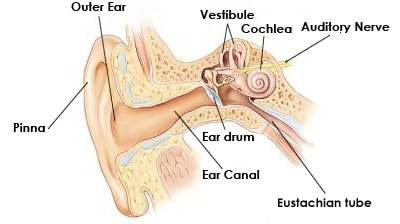Hearing Loss
Hearing loss is a partial or total inability to hear. Approximately 31.5 million people (nearly 10%) in the United States report having hearing loss. Three types of hearing loss exist: conductive (usually caused by a treatable medical condition), sensorineural (caused by damage to the hearing nerve and treated with hearing aids), and mixed (a combination of conductive and sensorineural hearing loss). There are many known causes of hearing loss, including noise exposure, wax, and ear infections.
If you think you or someone you know might have hearing loss, schedule an appointment with us for a hearing test. Untreated hearing loss has been linked to depression, anxiety, and social isolation.
Dizziness
Vertigo, or dizziness, is a symptom, not a disease. The term vertigo refers to the sensation of spinning or whirling that occurs as a result of a disturbance in balance (equilibrium). It also may be used to describe feelings of dizziness, lightheadedness, faintness, and unsteadiness. The sensation of movement is called subjective vertigo and the perception of movement in surrounding objects is called objective vertigo.
Vertigo usually occurs as a result of a disorder in the vestibular system (i.e., structures of the inner ear, the vestibular nerve, brainstem, and cerebellum). The vestibular system is responsible for integrating sensory stimuli and movement and for keeping objects in visual focus as the body moves.Vertigo is one of the most common health problems in adults. According to the National Institutes of Health (NIH), about 40% of people in the United States experience feeling dizzy at least once during their lifetime. Prevalence is slightly higher in women and increases with age.
Tinnitus
Tinnitus is ringing, buzzing, or other sounds without an external cause. A patient can experience tinnitus in one or both ears or in the head. Tinnitus affects as many as 40 million adults in the United States. Tinnitus can be either objective or subjective. In objective tinnitus, the doctor, as well as the patient, can hear the sounds. Objective tinnitus are subjective, which means that only the patient can hear the sounds. Subjective tinnitus is frequently associated with hearing loss. Approximately 90% of patients that experience subjective tinnitus have hearing loss. Subjective tinnitus can also be caused by impacted ear wax, ear infections, various disease states, hardening of the middle ear bones, head trauma, tumor on the hearing nerve, or ototoxicity (medication-related hearing loss).


